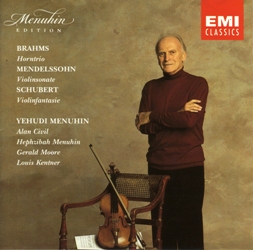Yehudi Menuhin - Brahms - Mendelssohn - Schubert (1991)
Yehudi Menuhin - Brahms - Mendelssohn - Schubert (1991)

Franz Schubert, Fantasia in C major D934 1. I.Andante molto 2. II.Allegretto 3. III.Andantino 4. IV.Andante molto 5. V.Allegro vivace 6. VI.Allegretto 7. VII.Presto Felix Mendelssohn , Sonata in F major 8. I.Allegro vivace 9. II.Adagio 10. III. Assai vivace Johannes Brahms , Trio in E-flat major, Op.40 11. I.Andante 12. II.Scherzo . Allegro-Molto meno allegro-Allegro 13. III.Adagio mesto 14. IV.Finale. Allegro con brio Y.Menuhin (violin). L.Kentner, G.Moore, H.Menuhin (piano). A.Civil (horn)
The American violinist and conductor, Yehudi Menuhin, had one of the longest and most distinguished careers of any violinist of the 20th century. Menuhin was born in New York of Russian-Jewish parents, recent immigrants to America. By the age of seven his performance of Mendelssohn's Violin Concerto had found him instant fame. As a teenager he toured throughout the world and was considered one of the greats long before his twentieth birthday. Even in his earliest recordings one can sense deeply passionate responses to the great composers. Though considered a technical master, it is his highly charged emotional playing that set him apart.
As a young man Yehudi Menuhin went to Paris to study under violinist and composer George Enesco. Enesco was a primary influence on Menuhin and the two remained friends and collaborators throughout their lives. During the thirties, Menuhin was a sought after international performer. Over the course of World War II he played five hundred concerts for Allied troops, and later returned to Germany to play for inmates recently liberated from the concentration camps. This visit to Germany had a profound effect on Menuhin.
As a Jew and a classical musician, Yehudi Menuhin had a complex relationship with German culture. He was fluent in German and deeply influenced by classical German composers. Menuhin found in the German conductor Wilhelm Furtwängler an important musical peer. Despite accusations of Wilhelm Furtwängler's pro-Nazi sympathies, Menuhin continued to support him and his work. It seemed that for many years, Menuhin led a double life. He was an outspoken supporter of dozens of causes for social justice, while also longing for a solitary life where he could ignore the concerns of society and attend only to the history of music and his role within it.
Throughout the 1940’s and 1950’s, Yehudi Menuhin performed and made recordings from the great works of the classical canon. During this time he also began to include rarely performed and lesser known works. One of his greatest achievements is the commissioning and performing of Sonata for Solo Violin by Béla Bartók. In Béla Bartók, Menuhin found a composer of deep emotion and pathos that mimicked his own. Béla Bartók's work was at once technically rigorous and open to interpretive playing. Of Menuhin, Béla Bartók said he played better than he imagined he would ever hear his work played. Their collaboration is considered one of the greats of twentieth-century classical music.
By the 1960’s, Yehudi Menuhin began to increase the scope of his musical involvement. In 1963 he opened the Yehudi Menuhin School, a school for musically gifted children. He also began conducting, which he would continue to do until his death. He conducted in many of the important music festivals and nearly every major orchestra in the world. It was around this time he also broke from his traditional roots and did work outside of the classical genre. One of his most successful ventures out of traditional performance was with the great Indian composer and sitarist Ravi Shankar.
Throughout the last twenty years of his life, Yehudi Menuhin continued to engage in every aspect of musical work. As a performer, a conductor, a teacher, and a spokesperson, he spent his seventies and eighties as one of the most active musicians in the world. He was a constant contributor to religious, social, and environmental organizations throughout the world.
Menuhin Yehudi (1916-1999), amerykański skrzypek, jeden z najwybitniejszych muzyków XX w. W wieku 4 lat rozpoczął naukę gry na skrzypcach u S. Ankera w San Francisco, następnie kształcił się u L. Persingera. W wieku 8 lat po raz pierwszy wystąpił publicznie jako solista (wykonał Symphonie espagnole E. Lalo). Od 1927 studiował w Paryżu u G. Enescu, w latach 1929–1930 u A. Buscha. Twórca festiwali muzycznych w Gstaad (Szwajcaria), Bath (Anglia) oraz Windsor Festival. Przy festiwalu w Bath utworzył zespół Bath Festival Orchestra (później zwany Menuhin Festival Orchestra), z którym rozpoczął karierę jako dyrygent. Współpracował m.in. z Berliner Philharnoniker, Royal Philharmonic Orchestra, Englisch Chamber Orchestra. W 1963 w Stroke d’Abernon założył Yehudi Menuhin Music School. Od 1984 rozpoczął współpracę z Polską Orkiestrą Kameralną oraz z Sinfonią Varsovią, której był pierwszym gościnnym dyrygentem. Występował i nagrywał płyty z największymi muzykami na świecie: B. Brittenem, D. Ojstrachem, G. Gouldem, S. Grappellim, R. Shankarem.
W 1972 otrzymał nagrodę niemieckich krytyków na Międzynarodowych Targach Książki we Frankfurcie nad Menem za autobiografię Unfinished Journey. Uhonorowany Orderem Lotaryńskim, Legią Honorową (Francja), Orderem Couronne, Orderem Leopolda (Belgia), Orderem Zasługi (Niemcy). W 1956 Królowa Elżbieta II nadała mu tytuł szlachecki oraz tytuł Komandora Imperium Brytyjskiego (CBE). Doktor honoris causa 27 uczelni.
Muzykę pisali dla niego kompozytorzy światowej sławy: B. Bartok, L. Berkeley, A. Panufnik. Wśród wychowanków Menuhina jest m.in. N. Kennedy.
download:
Last Updated (Monday, 07 July 2014 22:36)








